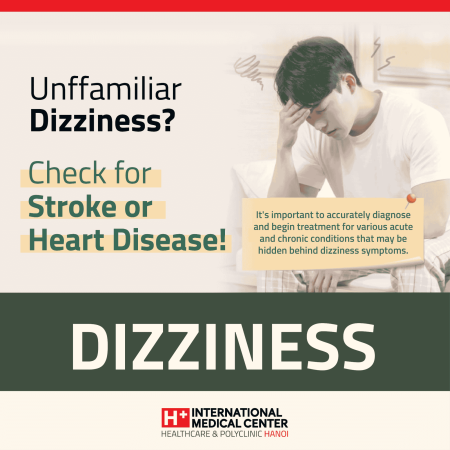Dizziness is a common symptom affecting millions of people, with 30–40% of cases related to benign paroxysmal positional vertigo (BPPV). Additionally, stress, lack of sleep, or neurological and brain disorders can also be culprits. Accurately identifying the cause is key to effective treatment and improving quality of life. To better understand dizziness and how to manage it, refer to this article from H PLUS.
1. Understanding Dizziness
Dizziness is a frequently encountered symptom across all age groups. Lifetime prevalence among adults is approximately 7.4%, while the one-year and one-month prevalence rates are 4.9% and 1.4%, respectively. The condition is more common in women, particularly those over 60.
Its causes are diverse and may involve vestibular disorders, neurological diseases, cardiovascular issues, or chronic stress. Accurate diagnosis and timely intervention are essential for improving patients’ quality of life.
Dizziness can manifest in different ways depending on its origin. Although it is one of the most frequent reasons for medical consultations and emergency visits, diagnosing it can be complex, often requiring collaboration across multiple specialties. While dizziness is often due to benign vestibular dysfunction, it can also signal serious underlying conditions involving the nervous or cardiovascular systems.
2. Recurrent Dizziness: High Risk Requires Proactive Management
Benign Paroxysmal Positional Vertigo (BPPV) is a common cause of recurrent, sudden-onset dizziness, characterized by brief spinning sensations triggered by head movements. It accounts for 30–40% of dizziness diagnoses. The condition results from displaced otolith crystals within the vestibular system, which overstimulate the balance mechanism.
Symptoms vary in intensity and may be accompanied by nausea, vomiting, palpitations, and cold sweats. Triggers include head trauma, sleep deprivation, stress, fatigue, or poor dietary habits. One effective treatment is otolith repositioning maneuvers, which restore the crystals to their proper location through specific head and body movements.
Symptoms often improve within two weeks, but recurrence is common. Patients should adopt a healthy lifestyle, avoid abrupt head movements, and change sleep positions regularly. Stress management techniques like meditation and breathing exercises are beneficial. Vitamin D deficiency is also linked to BPPV, so regular sun exposure is recommended to support natural synthesis.
3. Could Dizziness Signal a Neurological Disorder?
Dizziness may stem from serious neurological conditions. Central dizziness is often related to brain abnormalities and presents with additional symptoms such as persistent fatigue, imbalance, nausea, or headache.
Acute dizziness can also indicate stroke, particularly in individuals with chronic illnesses like hypertension or diabetes. Stroke-related dizziness results from disrupted cerebral blood flow or intracerebral bleeding.
Brain tumors may also cause dizziness by increasing intracranial pressure. As tumors grow, they may trigger vomiting, especially in the morning, and other symptoms like muscle weakness, slurred speech, vision impairment, or seizures. Neurodegenerative conditions such as Parkinson’s disease can cause chronic dizziness as well.
Accurate diagnosis may involve:
-
Eye movement tests
-
Vestibular nerve evaluations
-
Cerebral blood flow assessments
-
Autonomic nervous system function testing
-
Dynamic balance analysis
-
MRI scans
Effective treatment requires multidisciplinary collaboration across neurology, internal medicine, and ENT. In cases linked to brain disorders, prognosis may worsen if not promptly addressed—making early diagnosis and treatment crucial.
Comprehensive Neurological Care at H PLUS International General Clinic
H PLUS International General Clinic is a trusted facility specializing in the diagnosis and management of neurological disorders affecting both the central (brain, skull, meninges, cerebral vessels, pituitary gland, spinal cord) and peripheral (nerves and ganglia) nervous systems.
Our clinic is staffed with top-tier Korean advisors and experienced Vietnamese neurologists. Equipped with state-of-the-art diagnostic tools and a 5-star care model, H PLUS delivers precise, efficient, and professional health services.
For expert consultation or to book a neurological examination at H PLUS, please contact our hotline: +84 24-7306-9889.
—
Phòng khám Đa khoa Quốc tế H PLUS – H PLUS International Medical Center (H PLUS Hanoi)
“Y học tiên phong – Song hành cùng y đức”
- Địa chỉ: Tầng 7–8, Lotte Mall Tây Hồ, 272 Võ Chí Công, Hà Nội
- Website: clinichplus.com
- Hotline: 024 7306 9889
- Đặt lịch nhanh: https://forms.gle/8t84zLGVjw4gJQei9
- Zalo OA: https://zalo.me/hplushn
- Kakao Talk: https://pf.kakao.com/_AcWun
#Hplus #HPIMC #phongkhamdakhoa #clinic #LotteMallWestLakeHanoi
 +84 24-7306-9889
+84 24-7306-9889  Booking
Booking 



